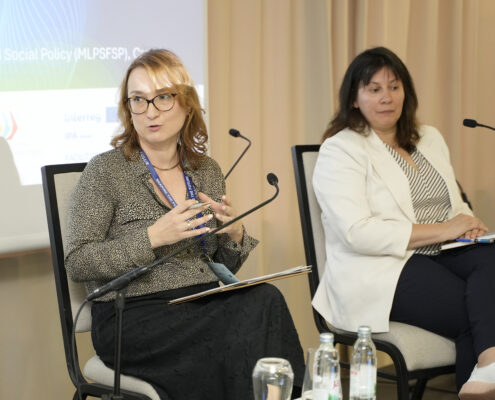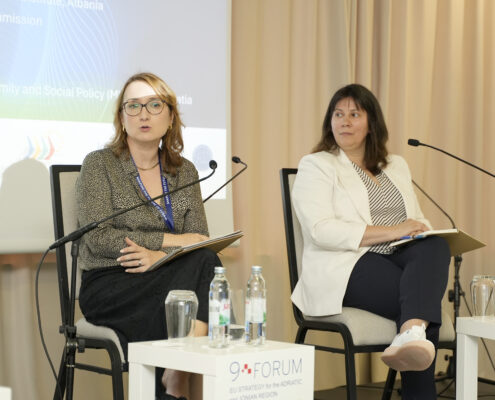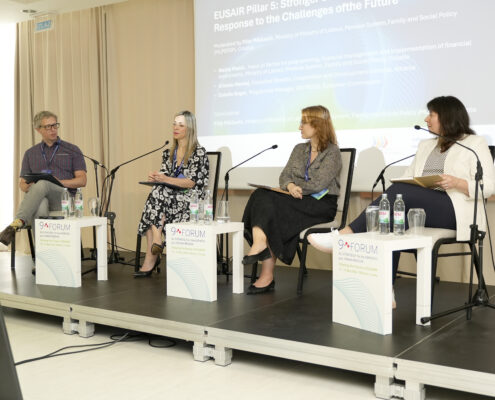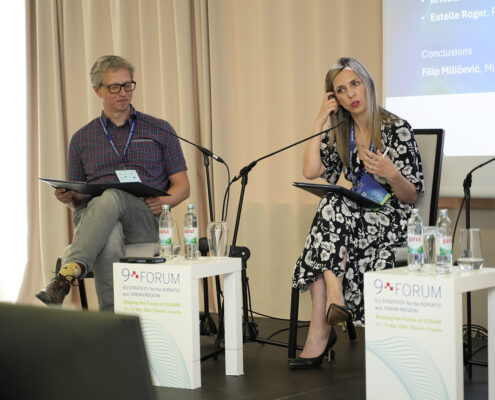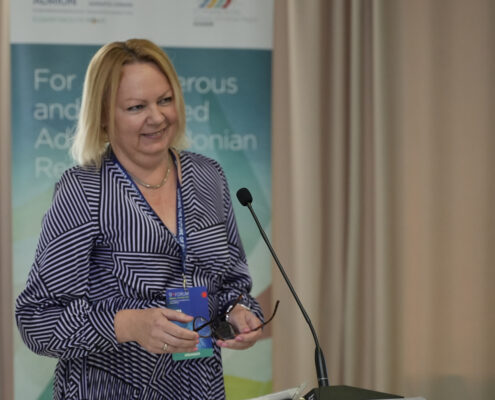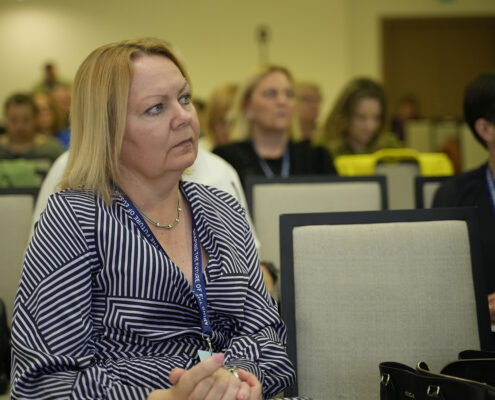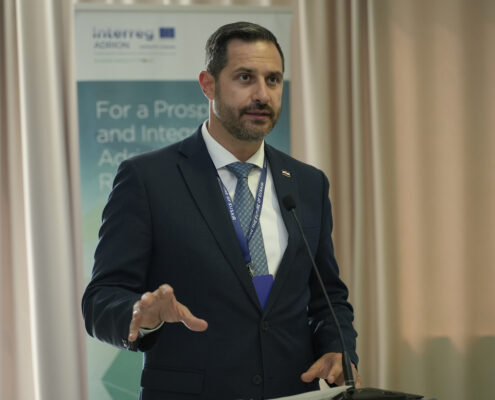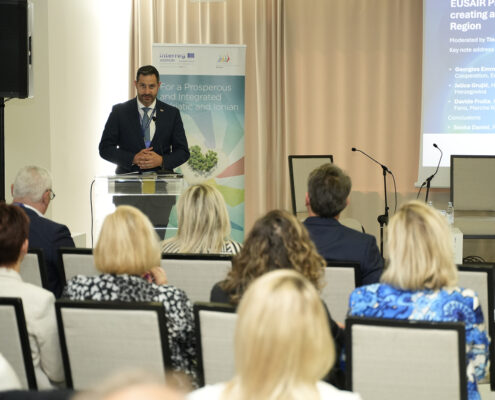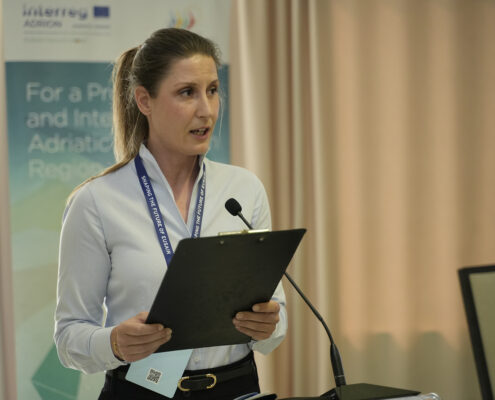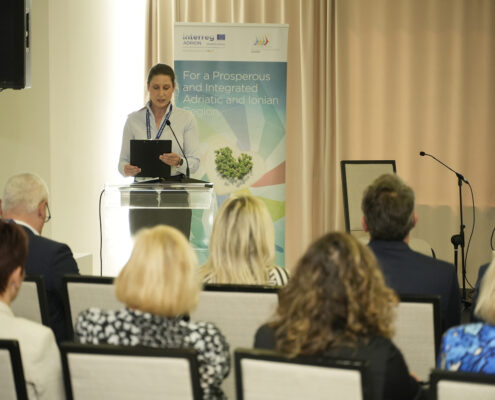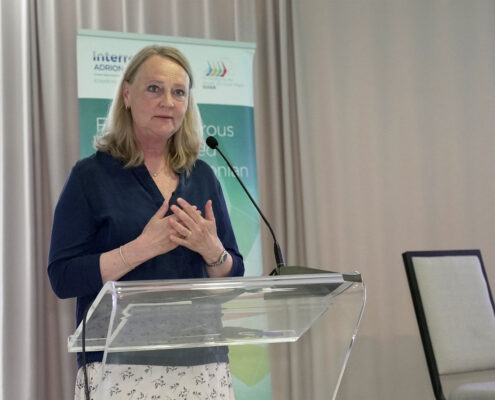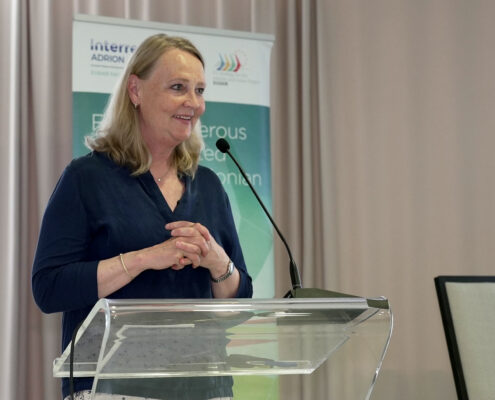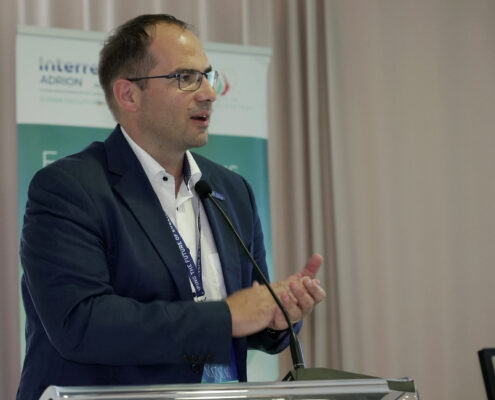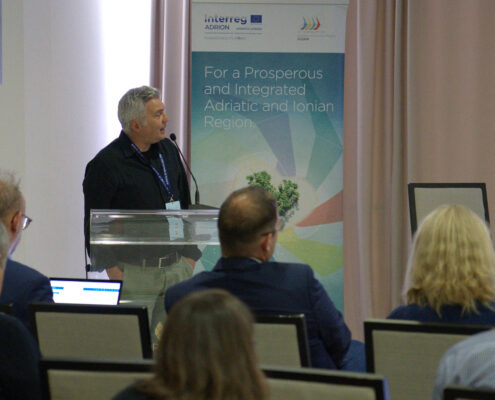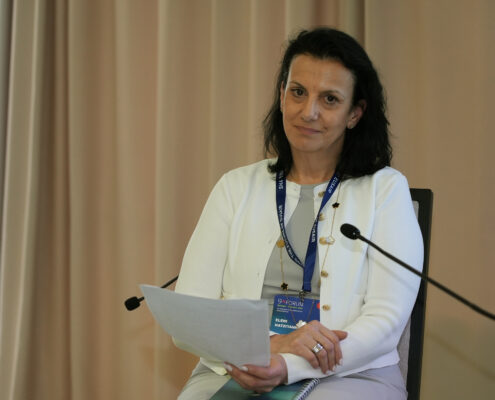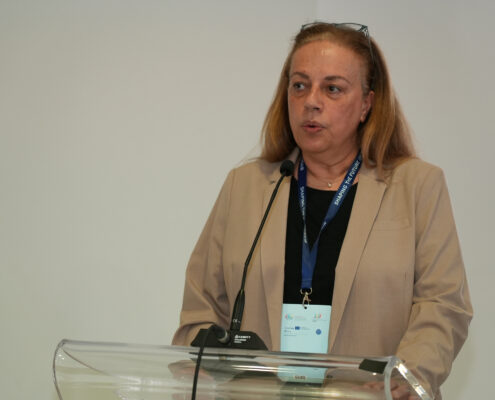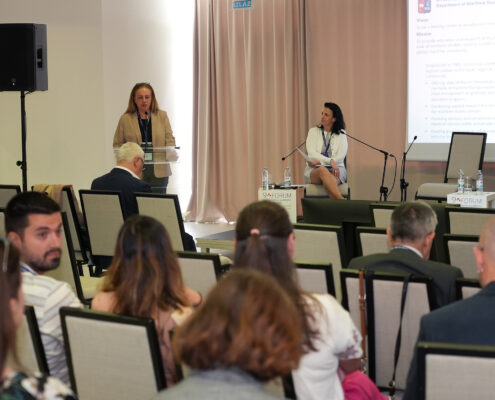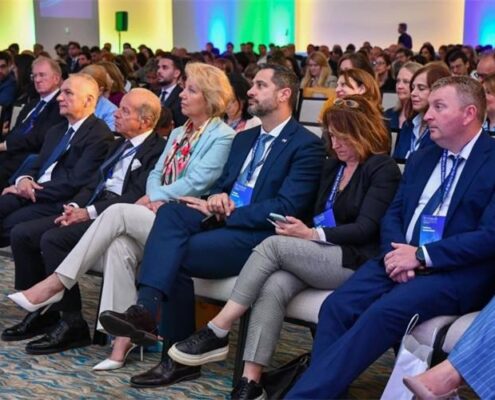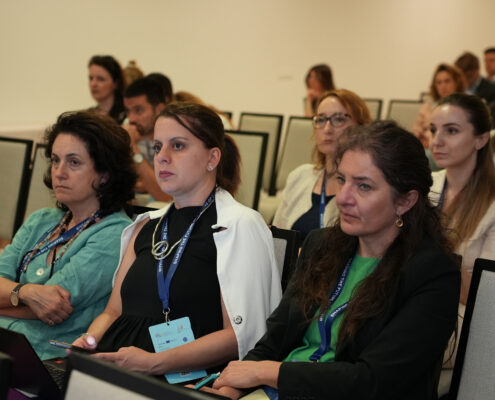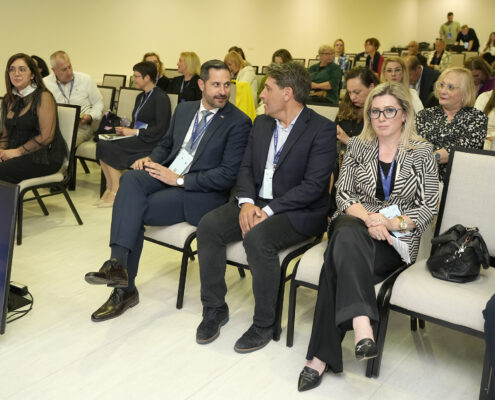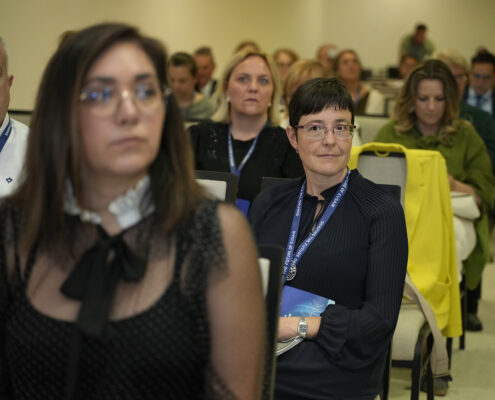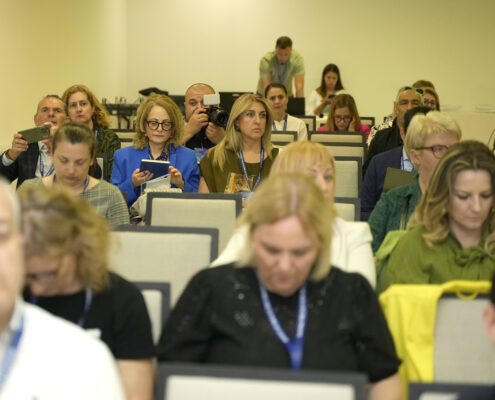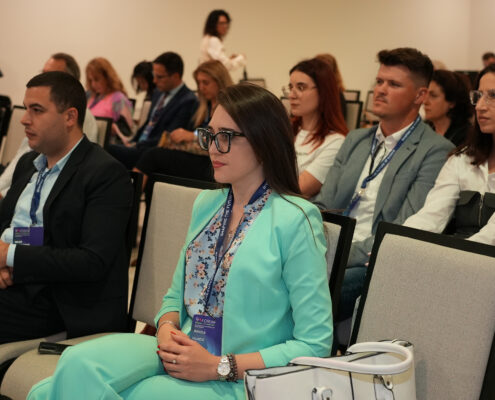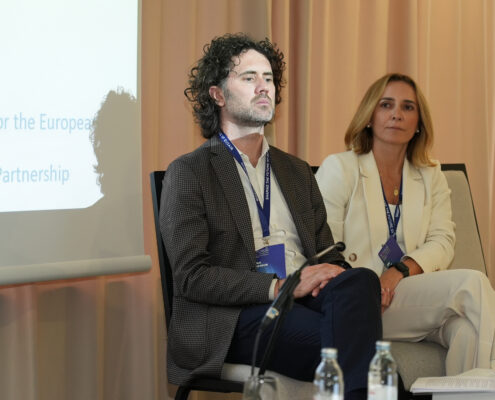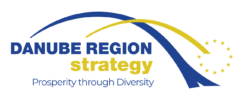9th Annual EUSAIR Forum
Šibenik, Croatia | 15 - 16 May 2024
A successful conclusion of the 9th EUSAIR Annual Forum
The 9th Forum of the EU Strategy for the Adriatic-Ionian Region (EUSAIR) took place in Šibenik from the 15th to the 16th of May 2024. This event has brought Croatia’s Presidency to a successful completion with the signing of the Šibenik Declaration that reflects the common efforts and achievements under the Croatian EUSAIR Presidency and outlines the way forward for the EUSAIR and the Adriatic – Ionian Initiative, agreeing on past accomplishments and on main priorities for the future. The Forum gathered high-level officials from all EUSAIR participating countries and over 700 participants from the entire macro-region.
The Croatian Minister of Regional Development and EU Funds, Mr. Šime Erlić, opened the Forum and underlined the role and added value of the EUSAIR and stressed the importance of macro-regional cooperation and Cohesion Policy post-2027, as well as the establishment of the fifth Pillar of Cooperation to the EUSAIR portfolio dedicated to improved social cohesion.
One of the central themes of this year’s Forum was Cohesion Policy post-2027. The Forum marked the start of the EUSAIR Stakeholder Consultation on the EUSAIR perspective on Cohesion Policy post-2027. The EU discussion on the Cohesion Policy post-2027 took place at a conference of European Committee of the Regions in cooperation with Interact and the Croatian Presidency of the EUSAIR. The aim of the discussion was to bring the attention of decision makers to the crucial role that Interreg plays for regions and cities as well as cohesion, enlargement, and the relations with the EU neighbouring countries.
In this light, the High-Level Panel discussion was likewise focused to the Cohesion Policy post-2027 and related pre-accession policies that could contribute to enhanced cooperation in the Adriatic and Ionian Region, as well as the priorities at the EU level in the following years and their relevance to the needs of the Adriatic and Ionian Region.
In addition, this year’s Forum’s focus was presentation of the results of EUSAIR revision process which aimed at rejuvenating the Strategy and making it more relevant an up to date, more operational and more capable of effectively addressing future challenges.
Further, the Forum acknowledged the addition of a new fifth Pillar of cooperation to the EUSAIR portfolio, which aims at further aligning the Adriatic-Ionian Region with the EU strategies and policies for improving social cohesion, in line with the broader framework of green and digital transition. To match the ambition of the New Action Plan, the Croatian Presidency also led the successful completion of the revision of the EUSAIR Governance Architecture.
The involvement of youth in the Strategy is another key aspect, marked by defining steps towards the establishment of the EUSAIR Youth Council. With it, youth of the Adriatic-Ionian region will gain a platform for wider collaboration and active participation in shaping the socio-economic development of their living space. In the weeks following the Forum, the EUSAIR Youth Council Call for Applications was successfully completed, with 185 applications received. The actual establishment of the EUSAIR Youth Council is planned for this Fall.
One of the new cross-cutting themes within the EUSAIR Action Plan is digitalization. In this light, the Special EUSAIR Presidency Conference explored the challenges, opportunities and best practices associated with digital transformation of public administration services, and stimulate discussions on potential joint projects among countries of the Adriatic and Ionian Region.
The forum concluded with a symbolic passing of the Presidencyof EUSAIR from Croatia to the Hellenic Republic. The Helenic Presidency to EUSAIR kick-off announcing priorities is planned for this Fall – more information will be published in due time.
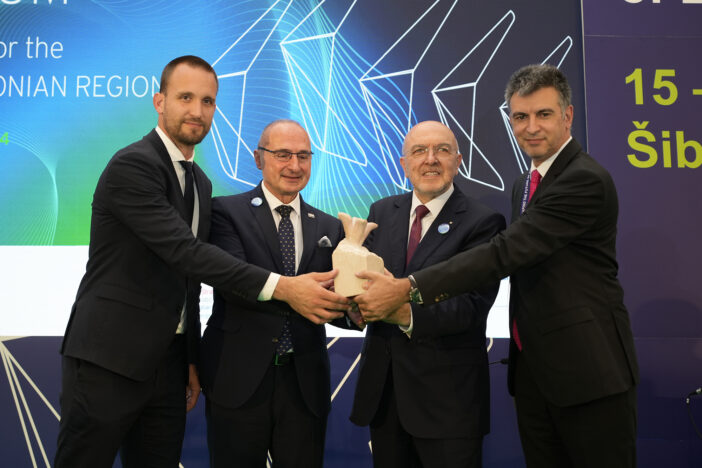
Read a comprehensive summary report of all sessions here or you might want to watch the recordings of the sessions on the EUSAIR website under each Pillar.
PILLAR I – Blue Growth, Session Conclusions
Several key points were highlighted regarding the development of blue skills to support a sustainable blue economy. A competitive blue economy requires highly qualified and skilled professionals, emphasizing lifelong learning, a mix of soft and hard skills, flexibility in skills acquisition, competency-based training, and increased women's participation in maritime jobs.
Read more on the conclusions of Pillar I Session
PILLAR II, Connecting the Region – Transport, Session Conclusions
The session focused on discussing the challenges and opportunities in enhancing rail connectivity within the region. The session also touched on the importance of the new Western-Balkan-Eastern Mediterranean Corridor, introduced in the current revision of the TEN-T core network, highlighting it as a critical opportunity for increasing funding opportunities, enhancing cooperation between countries, and harmonizing rail transport regulations and standards.
Read more on the conclusions of Pillar II – Transport Session
PILLAR II, Connecting the Region – Energy, Session Conclusions
The session focused on the transition towards decarbonized energy systems, addressing the new chapter for EUSAIR in renewable and green energy, emphasizing the need to accelerate commitment to decarbonization and explore new energy efficiency solutions in line with the European Green Deal. The session underscored the need to increase public awareness and involve new stakeholders to strengthen the renewable energy sector and highlighted the relevance of updating the Master Plan on Energy Policies and Programmes for the region to address the dynamic energy context and climate change challenges effectively.
Read more on the conclusions of Pillar II – Energy Session
PILLAR III, Environmental Quality, Session Conclusions
The session highlighted the importance of green and blue corridors in scientific research, crucial for maintaining ecological connectivity and enhancing the ecological status in the Adriatic Ionian region. The session included the need for cross-border collaboration to conserve biodiversity effectively due to the interconnected nature of ecosystems. The panel discussed the necessity of regional and international cooperation to tackle conservation challenges effectively, especially in addressing oil spills in the Adriatic Ionian region.
Read more on the conclusions of Pillar III Session
PILLAR IV, Sustainable Tourism, Session Conclusions
The session focused on updating the EUSAIR Action Plan, introducing new topics and actions aimed at fostering a green, digital, and resilient future for tourism. Achieving a sustainable future in EUSAIR tourism requires extensive multi-state and multi-stakeholder dialogues to unify around a shared vision. Underscoring the responsibility to preserve the natural and cultural heritage of the Adriatic-Ionian region and using the panel as a platform to discuss policy challenges in transitioning towards sustainable tourism models. The session concluded that EU policies and initiatives are crucial in driving the digital and green transition and should be continually explored.
Read more on the conclusions of Pillar IV – Sustainable Tourism Session
PILLAR V, Social Cohesion, Session Conclusions
The addition of Social Cohesion as the new, 5th pillar in the EUSAIR Strategy aligns closely with the fourth policy objective of the EU Cohesion Policy, aiming for a more social and inclusive Europe. The main goal is to align the Adriatic-Ionian region with EU strategies and policies for improving social cohesion within the broader framework of green and digital transition.
Read more on the conclusions of Pillar V – Social Cohesion Session





